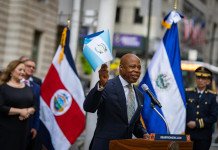From the Office of the Mayor of New York City:
Mayor Bill de Blasio: …a number of different areas. What I’m going to try to do in each briefing is create as much continuity with the previous briefing as possible. And as I said, I think we are going to be doing a lot of these for the weeks to come. So, let me start with, yesterday we talked in detail about the family from Westchester and the law firm, Lewis and Garbuz, where both the mother and father of that family worked. In addition to the mother and father, eight other individuals at the law firm – seven employees want to intern – four residents of New York City, four residents of areas outside New York City all have been tested. Here is what we know so far – for the four New York City residents, the tests have all come back negative. For the one resident beyond the couple of themselves from Westchester County, the test has come back negative. We have three more tests pending. We will have those results today and we’ll publish them as soon as we have them.
And everything’s very dynamic, as everyone is seeing, so these numbers can move at any given moment. But as of this moment, I’ve got – obviously, we’ll talk about the four confirmed cases, the four cases that tested positive, but now the number of negative cases is 26. We have 26 tests completed, have come back negative. We have two new cases confirmed this morning in New York City, a man in his forties, a woman in her eighties. Both are critically ill at this moment. Both did have substantial preexisting conditions. In the case of the man, respiratory issues related to smoking and vaping; in the case of the woman specific illnesses related to her advanced age. One is at a hospital in Brooklyn, one is at a hospital in Manhattan. Again, we’re going to try always to define what we are able to tell you, what we’re not yet able to tell you. Obviously, there’s a confidentiality issue here that we have to be sensitive to. These are voluntary hospitals, not public hospitals.
Okay. Now this gets into the issue of community spread, which we’re very, very concerned about obviously. And this is kind of defining a changing reality. So, today, we’re going to be talking about some strategic differences even compared to yesterday now that we have more evidence of community spread. So, in the case of these two individuals, neither one had a connection to the areas affected in other parts of the world. So, there no travel nexus. Neither one connected to any of the other cases we’ve seen. Our disease detectives are working with their families right away on mapping their contacts. And we’ll have more to say on that shortly and we’ll obviously be following up with any close contacts. The community spread issue – we are seeking a guidance from the World Health Organization and from the CDC now that it’s clearly established as a phenomenon here. We are trying every day to get a better understanding of this still new disease. We are not getting all the answers we would like, but, to be fair, the entire medical community around the world is trying to get clear answers and clear facts. What we do know is when you have a community spread dynamic, you have to assume it could be anywhere in the city. So, we are going to work on an assumption of the intense vigilance. We’re going to update our approaches as we get more information. A phrase I’ve just learned – transmissibility is sort of the amount or the ease with which this is transmitted. World Health Organization continues to say this disease is less transmittable than the flu. But again, we are watching carefully. A community-spread dynamic suggests it will be more pervasive and that worries us obviously in terms of how easy it might be for someone to come in contact. Again, goes back to what people can do. And this is the consistent part, because it is affirming as we use the example yesterday of the measles – it is not a disease that the substances hang in the air and if you come into a room where they’ve been present that it’s easy to contract. We know that is not the case. What we’re concerned about is direct contact with fluids. And so, that’s the area where people can do all the smart basics, the hand washing, the alcohol-based hand sanitizer – thank you, Commissioner, you’ve gotten that in my brain. Obviously, covering your mouth when you cough and sneeze – all those basics really matter.
Notwithstanding our real concern about the situation, the overall numbers still remain, in a sense, very favorable. We have only four confirmed cases. Obviously, out of 8.6 million people, we have 26 tests that have come back negative. I want to note, I should’ve said this up front for continuity – the two Yeshiva students who the disease detectives identified from the first Yeshiva – so, that is the roommate and the best friend of the student from Westchester – both have been tested, both came back negative. So, they’re in that negative number of 26. So, again, by the numbers, we remain in a strong situation. The community-spread dynamic is unpredictable and worrisome, so we’re watching carefully. And I want to alert everyone, each day we may tell you we’re finding something new about how this disease is acting in general, how it’s acting here in New York City, so our level of concern is rising for sure. That said, the big picture point, I’ll keep saying it, we do know this for a fact, over 80 percent of the folks who get it have very mild symptoms, very mild experience, and the vast majority of folks even who have more serious outcomes still end up seeing it through. So, it comes back to – I’m making really clear, we believe in a containment strategy. We understand there are limits to that at a certain point, but that is the strategy we’re using. We believe in a strategy that focuses on identification and testing. We believe deeply in the work of the disease detectives and we will be introducing you to some of them soon so you can get to see the real human beings who do this important work. But finding everyone who needs a test and getting them a test as quickly as possible and isolating them when they need to be isolated is the smart strategy.
We have a directive for all New Yorkers, and I’m first going to talk about all New Yorkers and then let’s specifically talk about City workers. For all New Yorkers, if you had returned from one of the five countries I’ll indicate, we’re asking you to isolate yourself for 14 days as a precaution. Any New Yorker coming back from any of these countries – China, Iran, Italy, South Korea, all on the current CDC list. Japan should be on that list we believe. So, from the point of view of New York City, if you’re coming back from Japan, you should isolate for 14 days. And obviously if you have symptoms, then you need to get to care and testing. Now, this is a brand-new thing I’m going to introduce to you today. Thanks to our Health Commissioner, this order is being issued as we speak – the Commissioner’s Order. And this refers to City workers, specifically first responders, health care workers and educators. So, this’ll be up online momentarily. Under this order, the Commissioner has the ability to determine case by case specific actions. And if the Commissioner determines that anyone fits the criteria and is a risk, they can be required to get a coronavirus test. Right now, I can tell you, anyone who has traveled to one of the affected countries and has symptoms will be required and the broad assumption has to be that those who have symptoms alone, except for a particular extenuating circumstances, anyone who has symptoms will be required to get tested and we will act in accordance to that test in terms of if and when they can return to work. Anyone who refuses testing must comply with a quarantine and there will be specific employment consequences if they refuse testing. We’ll get you the details on that.
I want to also emphasize – again, I think we’re in a very dynamic crisis, which I have said to you guys I believe will be months if we’re lucky. This is the first Commissioner’s Order, I doubt it will be the last. You will see evolving actions. This one refers only to city workers – obviously, the Commissioner has a power and I have the power to do things related to the general public as well. So this is – we’re going to take each step as needed. We’d love it if we don’t have to take a lot more steps, but we are prepared to do a lot more the moment we need to.
Consistent with the topic of City workers, an update related to schools. So, we have three teachers who have recently come back from Italy. I’m going to give you a lot of detail on one and then there’s two more where I can give you a little detail, but we will have more specific as soon as certain notifications have been made. First teacher, it was part of a high school trip at James Madison High School in Brooklyn, 3787 Bedford Avenue – 44 students and this teacher plus six other staff members went to Italy. My understanding is to one of the affected areas of Italy and that’s important here. Obviously, countries are experiencing this crisis but there are areas of particular concern. Came back on February 23rd. The teacher was symptomatic, the teacher has been tested, the teacher tests negative. We are assessing all the other staff and students on the trip. At this moment, we have none with symptoms and we believe we have a low-risk situation, especially given that we’re getting close to the 14-day mark, but they are being carefully assessed. If anyone needs testing, they will get it.
This is a good example of a situation I want to clarify about. We’ve been talking a lot about how to talk to parents. And I’ll say this – and at any point now or in the back and forth my health colleagues will jump in – but the basic guidance to parents who are very, very concerned right now is, if your children are healthy, at this moment, there’s very, very little to be concerned about. If your children have serious respiratory diseases or a compromised immune system, we want you to be extra vigilant and we want, in that case, we obviously want to make sure our schools are aware of those particular students. So, looking to the Chancellor and the Health Commissioner and the Deputy Commissioner that we obviously have the ability with school records and school health facilities, something you used to do, to understand school-by-school who those students are. We’re going to have particular sensitivity around those students, but, at this moment, because there’s not a single symptomatic student anywhere in New York City public schools that we know of, we’re not taking an additional action. But that, just the human guidance to parents – and I’m saying this as a parent – based on what our public health officials are saying is only if your student has a serious respiratory problem or have compromised immune system is there an immediate threat. Otherwise, as everyone is seeing, this disease disproportionately affects older folks and folks with a serious preexisting conditions, but, obviously, overwhelmingly it’s been adults.
Two other teachers – in this case, they both returned from a vacation in Italy over the winter break. So again, we’re getting close to the 14-day point. We will have more information shortly. Both are being tested today. We’ll have the results on that shortly and then we’ll talk about pending notification, the specific schools and any other follow up. But again, those teachers just went themselves personally on vacation, not with students or other staff.
I want to give you a couple of agency updates. Department of Correction – all housing units, day rooms and common spaces are now being cleaned once per day. Shower areas are being cleaned three times per day. Transport buses are being cleaned and sanitized daily. Staten Island ferry – every ferry, each boat will get a deep clean every 72 hours minimum, often more than that, more frequently than that. Terminals will be consistently clean, constantly clean. DOT crews are also handing out material on the ferry to educate customers as to the facts on the virus. Those – I obviously gave you some other agency updates yesterday. Those are some of the things that are happening in our government, but I want to emphasize we need from another government, the federal government. This is a still the case. Even though there was a little progress last few days, it’s still not what we need. We need the ability to test as many people as possible, as quickly as possible. We cannot do that without help from the federal government, period. The CDC has finally broadened the criteria, which is good, but we do not have the physical capacity. We need the FDA to speed up approval of the test developed by private companies. We just need this to be a consistent effort by the federal government. It has not been. The goal has to be the decentralized testing as quickly as possible and maximize our ability to do what we need to do.
One other piece of news, literally coming in just before I came out here from New Jersey, but related to us. We have one new case in New Jersey that has a significant nexus to New York City. We don’t have the details yet. Our health authorities are speaking to the New Jersey health authorities. I will be speaking to the Lieutenant Governor who’s in the role of Acting Governor, because Governor Murphy has been in surgery. So, Acting Governor Sheila Oliver, I’ll be speaking to her later on today. We will get you an update as soon as we have more of the details. We’re going to have our disease detectives engaged with the health authorities in New Jersey to track what that nexus is. So, we know there’s a case and we know there’s a nexus, but we don’t have the details on that. Hopefully we’ll have that in a matter of hours.
This press release was shared by the office of the Mayor of New York City, and views thereby expressed are solely authors.





